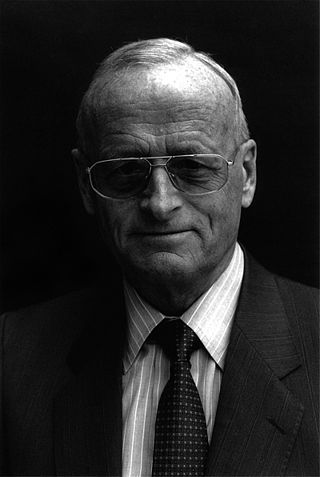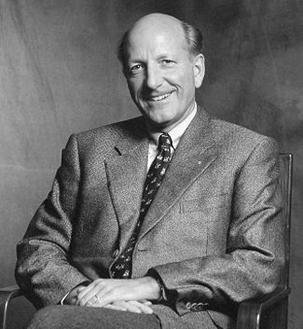
Volkswagen is a German automobile manufacturer based in Wolfsburg, Lower Saxony, Germany. Established in 1937 by The German Labour Front, it was revitalized into the global brand it is today after World War II by British Army officer Ivan Hirst. The company is well known for the Beetle and serves as the flagship marque of the Volkswagen Group, which became the world's largest automotive manufacturer by global sales in 2016 and 2017.

Volkswagen AG, known internationally as the Volkswagen Group, is a German public multinational conglomerate manufacturer of passenger and commercial vehicles, motorcycles, engines and turbomachinery. Headquartered in Wolfsburg, Lower Saxony, Germany, and since the late 2000s is a publicly traded family business owned by Porsche SE, which in turn is half-owned but fully controlled by the Austrian-German Porsche and Piëch family. The company also offers related services, including financing, leasing, and fleet management. In 2016, it was the world's largest automaker by sales, and keeping this title in 2017, 2018, and 2019, selling 10.9 million vehicles and was the largest automaker by revenue in 2022. It has maintained the largest market share in Europe for over two decades. It ranked seventh in the 2020 Fortune Global 500 list of the world's largest companies. In 2023, Volkswagen Group was the largest company in the European Union and the largest car manufacturer in the world by revenue.

Robert Bosch GmbH, commonly known as Bosch, is a German multinational engineering and technology company headquartered in Gerlingen, Baden-Württemberg, Germany. The company was founded by Robert Bosch in Stuttgart in 1886. Bosch is 94% owned by the Robert Bosch Stiftung, a charitable institution. Although the charity is funded by owning the vast majority of shares, it has no voting rights and is involved in health and social causes unrelated to Bosch's business.
An umbrella organization is an association of institutions who work together formally to coordinate activities and/or pool resources. In business, political, and other environments, it provides resources and identities to the smaller organizations. In this kind of arrangement, it is sometimes responsible, to some degree, for the groups under its care. Umbrella organizations are prominent in cooperatives and in civil society, and can engage in advocacy or collective bargaining on behalf of their members.

Volkswagen Group China is the Chinese subsidiary of the German automotive concern Volkswagen Group in the People's Republic of China.

The ADAC, officially the Allgemeiner Deutscher Automobil-Club, is Europe's largest automobile association. The ADAC is the largest verein (club) in Germany, with around 21 million members. Its headquarters are located in Munich. Its original and most well-known service is roadside assistance.

The Robert Bosch Stiftung GmbH is a German foundation that owns a majority shareholding in Robert Bosch GmbH, from which it derives its funding. The foundation was established in accordance with the wishes of Robert Bosch, who died in 1942, and conducts and finances social, cultural and scientific projects.

Carl Horst Hahn was a German businessman and head of the Volkswagen Group from 1982 to 1993. He served as the chairman of the board of management of the parent company, Volkswagen AG. During his tenure, the group's car production increased from two million units in 1982 to 3.5 million a decade later.

Toni Schmücker was the fourth chief executive officer of the Volkswagen automobile company, following the handover of the company in 1948 to German control from the British, who had administered the VW factory in Wolfsburg, Germany after the Second World War ended.

The Friedrich Ebert Foundation is a German political party foundation associated with, but independent from, the Social Democratic Party of Germany (SPD). Established in 1925 as the political legacy of Friedrich Ebert, Germany's first president, it is the largest and oldest of the German party-associated foundations. It is headquartered in Bonn and Berlin, and has offices and projects in over 100 countries. It is Germany's oldest organisation to promote democracy, political education, and promote students of outstanding intellectual abilities and personality.

Klaus Johann Jacobs was a German-born billionaire in the coffee and chocolate industry, with Swiss citizenship.

The Bertelsmann Stiftung is an independent foundation under private law, based in Gütersloh, Germany. It was founded in 1977 by Reinhard Mohn as the result of social, corporate and fiscal considerations. The foundation states that it promotes "reform processes" and "the principles of entrepreneurial activity" to build a "future-oriented society".

The charitable foundation Zeit-Stiftung Ebelin und Gerd Bucerius is registered in Hamburg. Its aim is to fund projects in research and scholarship, arts and culture, as well as education and training. It was founded in 1971 by Gerd Bucerius and carries the name of the founder, the title of the weekly newspaper Die Zeit, which he co-founded, and the nickname of his second wife, Gertrud Ebel, Ebelin.

Volkswagenwerk Braunschweig is a factory that makes Volkswagen automobile parts in Braunschweig, Germany. Production started on 1938-02-23 for manufacturing steering components of KdF-Wagen and tools for Junkers Flugzeug- und Motorenwerke in Dessau. Components for vehicles of VW Group are produced, including running gears, axles, shock absorbers, brake parts and pedals.

AutoMuseum Volkswagen is an automobile museum in Wolfsburg, Lower Saxony, Germany. Opened in April 1985, it is one of two museums in Wolfsburg devoted to the history of the Volkswagen brand; the other is at nearby Autostadt.
Courage was a German feminist newspaper published monthly from 1976 to 1984.

The Wolfsburg Volkswagen Plant is the worldwide headquarters of the Volkswagen Group. Situated in Wolfsburg, Germany, it is one of the largest manufacturing plants in the world, with an area of just under 6.5 million m2 (70 million sq ft) and a building area of 1.6 million m2 (17 million sq ft). In 2015 the plant produced 815,000 cars. Volkswagen's currywurst is also produced at this facility.

Peter Keetman was a German photographer.
The Volkswagen Zwickau-Mosel Plant is an automobile factory in today's Zwickau district of Mosel, Germany. Founded on 26 September 1990, together with the Chemnitz plant and the Transparent Factory, it belongs to Volkswagen Sachsen, based in Zwickau. Currently, the Zwickau plant has about 8,000 employees. Signalling a milestone the last combustion vehicle was produced on 26 June 2020.

Workers of the German auto manufacturer Volkswagen Group are collectively organized and represented by unions and Works Councils across the globe. Workers are organized on multiple levels; locally, regionally, nationally, internationally and by marque.


















